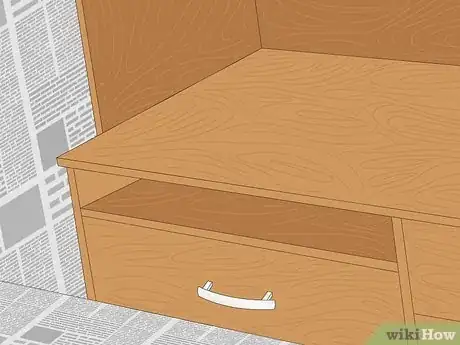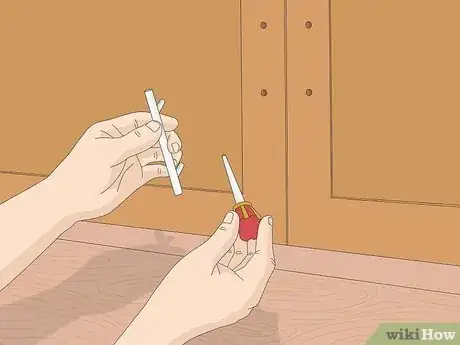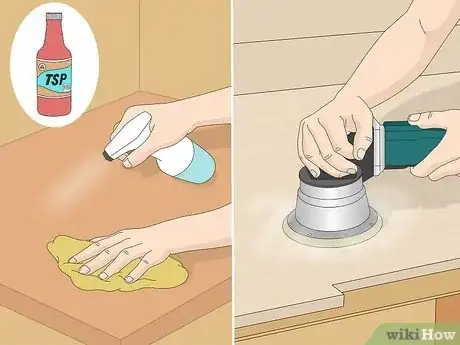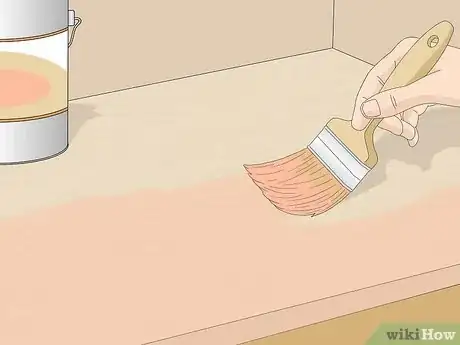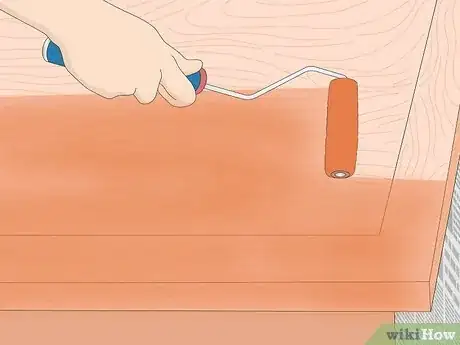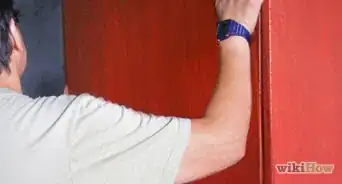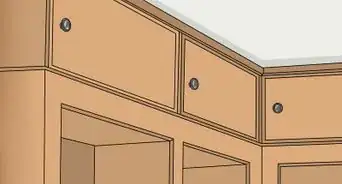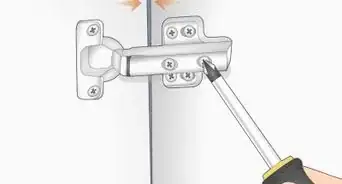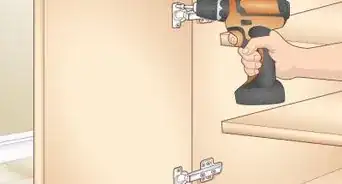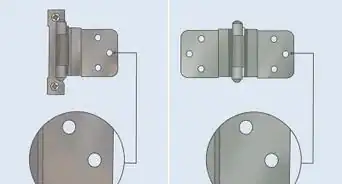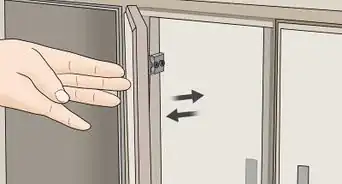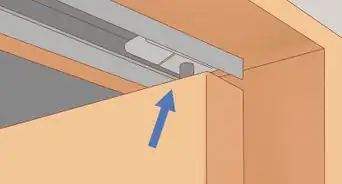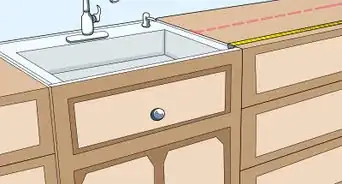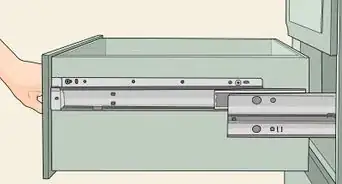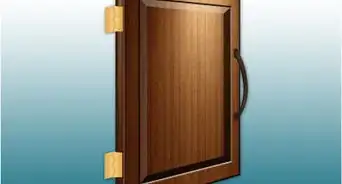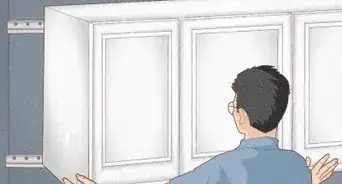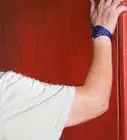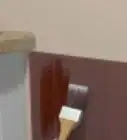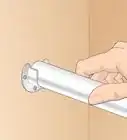X
This article was co-authored by Kevin Snow. Kevin Snow is a Commercial Painting Professional and the Owner of Ridge Painting Company. With over 12 years of experience, he specializes in painting commercial facilities and new build constructions. Kevin and his team are fully licensed and insured.
There are 7 references cited in this article, which can be found at the bottom of the page.
This article has been viewed 92,935 times.
Painting cabinets is a great way to transform a room's aesthetic. No matter what finish your cabinets are, it is possible to paint over them if you take the appropriate preparatory measures. Follow these instructions to paint varnished cupboards.
Steps
-
1Cover all of the surfaces that you do not want to get paint on. This includes countertops, appliances, walls, trim, backsplashes and floors.
-
2Remove the cabinet doors. In addition to removing the cabinet doors from the cabinet bases, you will also need to remove all of the hinges, handles and pulls before painting cabinets. Set all hardware and screws to the side in a safe place. You may want to label your hardware, as necessary, if you have varying door sizes and hardware types.[1]Advertisement
-
3Fill any surface dents, holes and dings. Use a spackling knife to press either spackling compound or wood putty into any imperfections you wish to paint over, then allow the product to dry according to the manufacturer's instructions.[2]
-
4Prepare the cupboard surfaces for painting. Before you paint varnished cupboards, you must remove the high-gloss finish. You may do this either of 2 ways:[3]
- Take an orbital sander to cabinet surfaces you plan on painting, and sand them down until they are no longer shiny. Wipe the dust off with tack cloth.
- Clean the cabinet surfaces with TSP (or a TSP substitute) a heavy-duty cleaner that can be found in any home improvement store, which removes thick layers of grease, dirt and grime. Repeat the TSP cleaning process until the cabinet finish is dull, then wipe the surfaces down with water to remove any remaining traces of TSP.[4]
-
5Prime the cupboards. Before painting cabinets, you need to prime them to ensure the paint sticks.[5]
- Use any stain blocking and sealing primer that you purchase from a home improvement store.
- Choose a color as close to your paint color as possible.
- Apply the primer with a roller on long, wide surfaces, and with a brush for the areas that can't be covered with a roller.
- Allow the primer to dry according to manufacturer's instructions.
- Paint a second coat before painting cabinets if the first primer coat didn't fully cover the cabinet surfaces.
-
6Paint cabinets. Use a roller and/or a brush as necessary, being sure to apply the paint in long, smooth strokes. Allow the paint to dry in between coats, and repeat the process until you are satisfied with the coverage.[6]
Advertisement
Community Q&A
-
QuestionHow do I choose the right type of paint for my cupboards?
 Community AnswerGetting ready to put it on my kitchen cabinets. You can go to a hardware store and ask them to help you pick out the right choice. I have used Devoe Devguard in the past with success, so I would recommend that.
Community AnswerGetting ready to put it on my kitchen cabinets. You can go to a hardware store and ask them to help you pick out the right choice. I have used Devoe Devguard in the past with success, so I would recommend that. -
QuestionHow can I tell if I used a primer on my cabinets?
 Community AnswerYou can tell a good quality primer was used, as it hides surface problems far better and has greater adhesion and leaves a much thicker depth to the look. Without it you will notice all deformities, the wood grain and wood surface problems that a good primer hides.
Community AnswerYou can tell a good quality primer was used, as it hides surface problems far better and has greater adhesion and leaves a much thicker depth to the look. Without it you will notice all deformities, the wood grain and wood surface problems that a good primer hides.
Advertisement
Warnings
- Never sand a varnished surface or apply paint without first ensuring that you are in a well-ventilated area. You may also want to wear a face mask. If you are pregnant, then you should understand that there are health risks associated with breathing dust and vapors, and it is therefore advisable that you avoid them altogether.⧼thumbs_response⧽
- Be sure to wear rubber gloves when using TSP, and follow the manufacturer's instructions to ensure your safety.⧼thumbs_response⧽
Advertisement
Things You'll Need
- Screwdriver
- Orbital sander
- Tack cloth
- Gloves
- Spackling compound or wood putty
- Spackle knife
- TSP (or TSP substitute)
- Rags
- Primer
- Paint rollers
- Paint brushes
- Paint
References
- ↑ https://www.youtube.com/watch?v=kZJofBBpZkQ
- ↑ https://www.bobvila.com/articles/how-to-use-wood-filler/
- ↑ https://www.youtube.com/watch?v=kZJofBBpZkQ
- ↑ https://www.bobvila.com/articles/cleaning-with-tsp-trisodium-phosphate/
- ↑ https://www.thisoldhouse.com/how-to/how-to-paint-your-kitchen-cabinets
- ↑ https://www.youtube.com/watch?v=QwrnQT39Oxw
- https://www.thekitchn.com/how-to-paint-wood-kitchen-cabinets-with-white-paint-248186
- http://www.decorate-redecorate.com/painting-cabinets.html
About This Article
Advertisement
